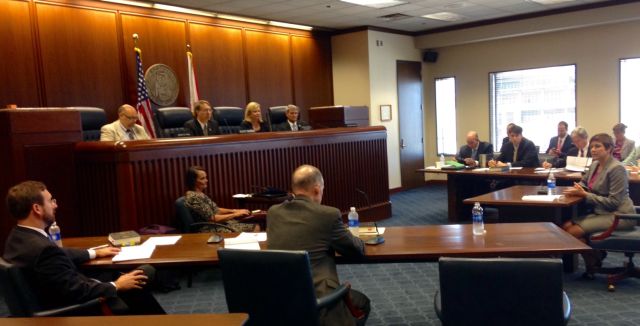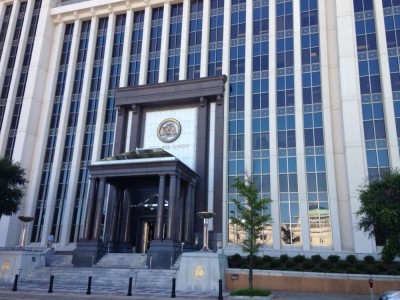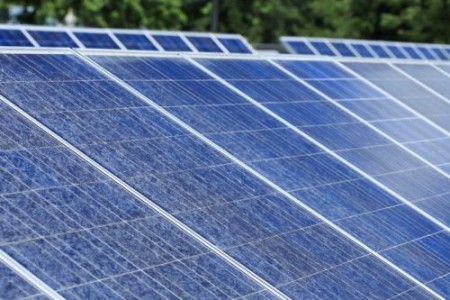PSC holds public hearing on Alabama Power’s renewables proposal

The Alabama Public Service Commission (PSC) held a public hearing on Alabama Power’s proposal to secure up to 500 megawatts of renewable generation for customers over the next six years.

Alabama Power’s regulatory policy manager, Noel Cain (r), fielded questions from PSC staff and others during meeting.
Noel Cain, regulatory policy manager for Alabama Power, answered questions from PSC staff and others during the hearing, which lasted more than three hours.
A number of organizations, including the Southern Alliance for Clean Energy, Alabama Environmental Council, JobKeepers Alliance, Alabama Industrial Energy Consumers, Gulf States Renewable Energy Industries Association and the state Attorney General’s office participated in the hearing.
John Free, director of the PSC’s electricity policy division, drilled Cain on details of the proposal, including how the company will determine what projects are the best value for customers. Cain said the company will conduct detailed analyses of the options, including the possibility of building a project itself versus purchasing renewable energy from others through long-term contracts.
The company will also examine market conditions and employ third party experts to determine the best options. She said cost would be the key driver, with reliability also being a factor.
Olivia Martin, representing the Alabama attorney general’s office, asked whether the company has identified specific renewable projects the company plans to focus on first. Cain said projects at the state’s military bases would likely be the “first out of the gate” but that the company also has had inquiries from other federal agencies, as well as from private businesses and industries.
Keith Johnston with the Southern Environmental Law Center asked whether there are benefits of renewable projects beyond those going to specific customers who contract for the energy.

RSA Union building in Montgomery was the location of hearing.
Cain noted that adding renewables could help further diversify the company’s energy sources, giving the company greater flexibility in choosing the most cost-effective option for customers. Solar energy, for example, could potentially help offset higher-cost energy sources during the hottest part of the day. She also said that some renewables could potentially assist the company meet future mandates for reducing carbon emissions as proposed under the recently unveiled federal Clean Power Plan.
Johnson also asked whether renewables could aid economic development. Cain said the company hasn’t had any potential industry assert that they wouldn’t locate in the state because of a lack of renewables. On the other hand, expanding renewable options could be an added attraction for some companies that have set their own corporate goals to secure a percentage of their energy from renewables.
A representative for the Gulf States Renewable Energy Industries Association praised the proposal and asked whether the company believes some projects would be located in-state. Cain said while no specific projects are confirmed yet, she anticipated some projects would likely be located in Alabama. She said the company has received more inquiries regarding renewable projects since the proposal before the commission was made public.
Amelia Shenstone, with the Southern Alliance for Clean Energy, applauded the company for proposing to add renewables in a cost-effective way. She described as “excellent” the company’s goal of securing renewable projects that would help put downward pressure on rates.
Cain said, “our company’s position is to negotiate the best possible price” for the benefit of all customers.
The commission could vote on the proposal as early as next month.
Details of the proposal
Alabama Power developed the proposal after months of conversations with customers about the kinds of renewable options they would like to see, in addition to the company’s existing hydro and wind resources. Filed with the PSC in June, the plan would allow Alabama Power to pursue a variety of projects, including solar projects, of up to 80 megawatts each, up to a total 500 megawatts over the six-year period.

The plan would allow Alabama Power to pursue a variety of projects, including solar projects, over the six-year period.
The plan provides broad options for the company to work with customers who have made renewable generation a priority, while protecting other customers from bearing additional costs.
Under the proposal, Alabama Power would have to begin at least one project within a year of commission approval.
While Cain noted the state’s military bases are among the Alabama Power customers interested in renewable energy, other government agencies, as well as commercial and industrial customers, also have expressed interest in renewables, she said.
Nearly half of the nation’s Fortune 500 companies have established some type of renewable energy goal, Cain noted. Nearby, Volkswagen’s manufacturing plant in Tennessee has constructed a solar facility and Google, which has announced plans to build a data center in North Alabama, plans to secure its electricity for the facility from renewable sources.
Under the proposal pending before the PSC, Alabama Power could construct its own renewable projects or purchase renewable generation from other sources, up to the 500 megawatt limit. If the cap is reached, the company would have to seek further PSC approval for the acquisition of additional renewable generation.
All projects would be submitted to the PSC staff and the state attorney general’s office for review. To qualify under the plan, a project would have to meet criteria established by the commission, including showing that the project is expected to yield positive economic benefit to all customers, placing downward pressure on rates.
Five hundred megawatts of solar can supply enough renewable energy to serve up to 100,000 homes during an hour of peak sun intensity on cloudless days. Alabama Power already has 1,600 megawatts of hydro resources across Alabama and 404 megawatts of wind generation from projects in Kansas and Oklahoma. Alabama Power has the ability to resell the energy from its wind generation, or the associated renewable energy credits unbundled from the energy, to third parties, to help keep rates low for customers. Qualifying renewable projects could provide the same flexibility.





